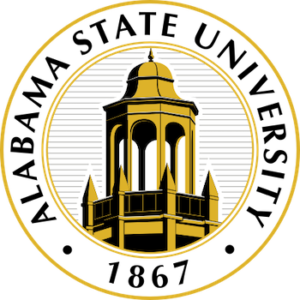
*On this date, 1867, Alabama State University (ALASU) was founded. It is a public Historically Black University (HBCU) in Montgomery, Alabama, and a Thurgood Marshall College Fund member school.
ALASU began as the Lincoln Normal School of Marion in Marion, Ala. In December 1873, the State Board accepted the transfer of title to the school after a legislative act was passed authorizing the state to fund a Normal School, and George N. Card was named president. So, in 1874, this predecessor of Alabama State University became America's first state-supported educational institution for Blacks. This started their history as a "teachers' college." In 1878, their second president, William Paterson, was appointed. He is honored as a founder of Alabama State University and was the president for 37 of the school's first 48 years. Paterson was instrumental in the move from Marion to Montgomery.
In 1887, the university opened in its new location in Montgomery. However, an Alabama State Supreme Court ruling forced the school to change its name; it was renamed the Lincoln Normal School for Colored Students. The campus was chosen in 1889, Lincoln Normal School became a junior college, and 1928 became an entire four-year institution. In 1929 it became State Teachers College, Alabama State College for Negroes in 1948, and Alabama State College in 1954. In 1969, the State Board of Education, then the university's governing body, approved a name change to Alabama State University. The 1995 Knight v. Alabama remedial decree transformed ALASU into a comprehensive regional institution, paving the way for two new undergraduate programs, four new graduate programs, diversity scholarship funding, and endowment, funding to build a state-of-the-art health sciences facility, and a facility renewal allocation to refurbish three existing buildings.
The school's radio station, WVAS-FM, was launched on June 15, 1984, from the fifth floor of the Levi Watkins Learning Center for two years before moving to its current location at Thomas Kilby Hall. Today, WVAS has grown to 80,000 watts and has a listenership that spans 18 counties, reaching a total population of more than 651,000. In recent years, the station has also begun streaming its broadcast via the Web, connecting a global audience to the university. The early 1990s witnessed the beginning of WAPR-FM (Alabama Public Radio), in which Alabama State University and Troy University, which already held station licenses, cooperated with the University of Alabama in building and operating. WAPR-FM 88.3, Selma's signal reaches the region known as the Black Belt, about 13 counties in the west central and central parts of Alabama, including Montgomery.
Alabama State offers 47 degree programs, including 31 bachelor's, 11 master's, two Education Specialists, and three doctoral programs, a Doctorate in Educational Leadership, Policy, and Law, a Clinical Doctorate in Physical Therapy, and a Doctorate in Microbiology. In addition, the university offers the W.E.B. DuBois Honors Program for undergraduate students who meet the above-average performance criteria. Due to Alabama State offering only one engineering degree program (B.S. in Biomedical Engineering), the university established a dual degree engineering program with the University of Alabama at Birmingham (UAB) that gives qualified ALASU students automatic admissions into UAB's undergraduate engineering program. ALASU undergraduate students who complete the program will receive a STEM-related bachelor's degree from ASU and an engineering bachelor's degree from UAB in approximately five years.
The Commission accredits Alabama State on Colleges of the Southern Association of Colleges and Schools, the Association of Collegiate Business Schools and Programs, the National Council for Accreditation of Teacher Education, the National Association of Schools of Music, the National Association of Directors of Teacher Education and Certification, the Accreditation Council for Occupational Therapy, the Commission on Accreditation of Allied Health Education Programs, Commission on Accreditation for Health Informatics and Information Management Education (CAHIIM, the National Association of Schools of Theatre (NAST), and the Council of Social Work Education. More than 70 student organizations are chartered at Alabama State, including seven National Pan-Hellenic Council Greek-letter organizations, a full range of men's and women's intramural and intercollegiate sports, and 17 honors organizations.
In addition to social, cultural, and religious groups, there are musical opportunities, such as the marching and symphonic bands, the choir, and departmental organizations for most majors. The Hornets also have a Student Government Association, in which every student at the university holds membership. Two media publications serve students: The Hornet Tribune (the student newspaper) and The Hornet (the student yearbook). The Bama State Collegians is a big band jazz orchestra sponsored by Alabama State University. In the 1930s, the ensemble was directed by noted jazz trumpeter Erskine Hawkins, an inductee of the Alabama Jazz Hall of Fame and the Alabama Music Hall of Fame. After moving to New York City, the Collegians, directed by Hawkins, became the Erskine Hawkins Orchestra and produced a string of national hit records, including "Tuxedo Junction," "After Hours," "Tippin' in," and others. The song "Tuxedo Junction," with its Hawkins and the Glenn Miller Orchestra recordings, became one of the anthems of World War II. In 2011, Hawkins' story of and his start in the Bama State Collegians was the subject of a Florida State University Film School MFA thesis film, The Collegians, written and directed by Alabama State University alumnus Bryan Lewis.